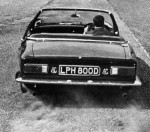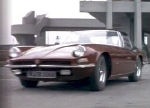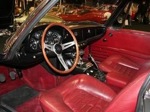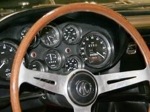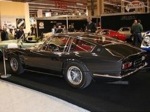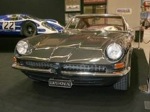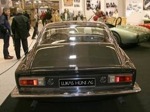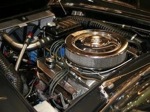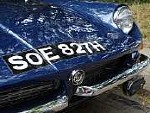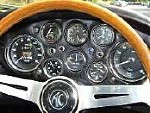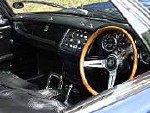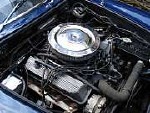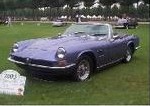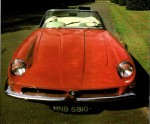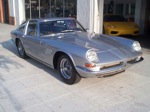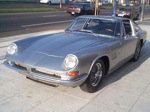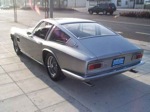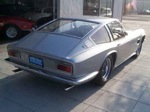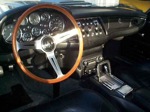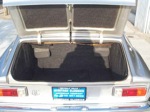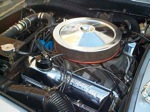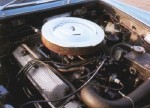- [Prototype] All-Aluminium body, no side vents behind front wheels.
- Driven by John Steed [Patrick McNee] in episode "Invasion of the Earthmen" of "The Avenger's" TV Series [do a find on "LPH 800D"], also appears in the following Avenger's episodes after Steed's character gives the car to Tara:
- The Forget-Me-Knot,
- Super Secret Cypher,
- Snatch,
- You'll Catch Your Death,
- Split!,
- Whoever Shot Poor George...,
- Look - (stop me if...,
- Get-A-Way!,
- My Wildest Dream.
However, the car is only driven by Steed/McNee in the "Invasion of the Earthmen" episode.

Owned by Derek Hurlock (AC Cars Ltd.), Use as demonstrating cars, 1969 illustration in the sales folder
Pictures and Text from MotorLegends.com / Gilles Bonnafous translated from French by Bablefish:
AC 428 Frua by Gilles Bonnafous 14-02-2006
Among the cars presented on its stand by the Swiss merchant Lukas Hüni, a very exclusive car held particularly our attention: the half-compartment AC 428 fitted with body by Frua and which was the show bus presented at the living room of Geneva of 1966.
After the mythical Cobra, AC decides to build a luxurious version WP of the latter animated by the engine Ford V8 of 428 c.i. A convertible is initially presented in 1965, before the model is not declined in half-compartment. It will be noted that the same year, Monteverdi starts to build in Switzerland a sporting half-compartment also drawn by Frua, but motorized by V8 Chrysler.
The frame of the Cobra Mk III was lengthened of fifteen centimetres. It receives Ford V8 428 c.i. (seven liters) coupled with a gear box to four reports/ratios. Sent at Frua in Turin, it is equipped with the body, which presents some similarities with Maserati Mistral, also work of Frua. The car turns over then to England to be equipped there with the last completions.
Initiated in 1966, the production of AC 428 Frua will cease in 1974 and only 80 cars will be built. Several factors explain this weak diffusion: strikes which have occurred in Italy, some problems of deliveries of the Ford engines and, in fine, the crisis of oil at the beginning of the Seventies. Fifty-eight half-compartments will be built, of which about thirty would have survived.
The car present at Rétromobile is single in more than one way. Carrying the chassis number CFX4, it acts of a prototype, which, in addition to its exposure to the living room of Geneva, was used for the realization of the booklet of the model. The cockpit profited from a particular treatment, which benefits in the dashboard and saddlery. It should be noted that it comprises only two seats, the capacity of the gasoline tank having been increased. Moreover, we are in the presence of one of the rare specimens with control on the left and manual gear box.
With step more than 25 000 kilometers to the meter, this half-compartment AC 428 appears in a remarkable state of origin. It had only two owners in forty years of existence, two Swiss collectors.
With the passing of years, the car was modified and improved. Mechanics received characteristics specific to the engines of competition: two oil radiators, a system of reinforced cooling and a sophisticated suspension. The power is about 400 CH. Halibrand wheels were also assembled.
Both # 4-5 are Fastbacks according to Motor test of CF 7
[Former] UPG 428F
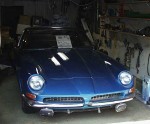
Factory Press Loaner Car for a number of years.
Current Location: Chicago Suburbs, Owner: cmaddox3 family


